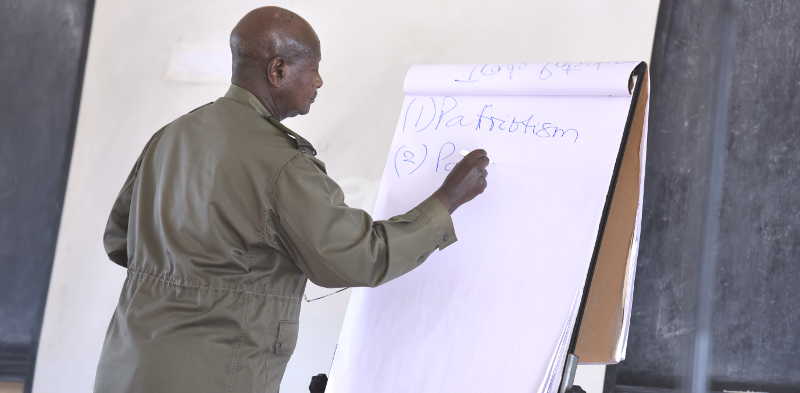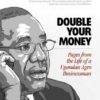Columnists
Economic realities to reflect on in 2017
I do not need to check people’s bank accounts to know that majority of them are empty right now!
Uganda has a mission. We are aspiring to become a middle income economy in the next three years. Many Ugandans you will talk to believe it is mission impossible. Some are excited with the ‘strategic’ goal. My own views are on the shelves.
Whichever side you belong in this debate, my damn feeling is that 2017 is going to be the defining year for this valid ambition. Wisdom has it that “The best qualification of a prophet is to have a good memory.”
My memory tells me that Uganda’s economy has been admitted in the outpatient section since 2011. Last year it was shifted to the inpatient unit, with a ready booking for intensive care unit (ICU). In The Economy in 2016, my last piece of 2016, I attempt to explain the factors behind the rapid deterioration in the health of the economy.
Admittedly, most economic analysts are taught to look at the economy in entirety – we love to identify ourselves as macroeconomists. The macro lenses often stop us from seeing the real issues that determine the health of the overall economy.
Although economists learn microeconomics as a core subject, we often leave the lessons in the grades obtained at the graduate school. We join the bandwagon that thinks economic prosperity starts and ends with government and its agencies such as Bank of Uganda, as well as the international organisations such as the World Bank, the IMF and others.
Unable to save & create wealth!
I admit I am one of the offenders here, just like many other economists. However, once in a while I reflect on some of these weaknesses. If the economy is an aggregate of the various economic units (individuals, households, businesses, not-for-profit organisations, multinationals, and government), why are we embroiled in wanting to fix it in entirety?
Why do we seldom carryout a proper check and diagnosis of the economy to establish the particular economic unit that needs repair? If a car stops moving normally, don’t we first establish the part that needs fixing? Why, in the case of the economy, do we want to overhaul a car that has just gotten a tyre puncture? Why don’t we fix the tyre and instead go on tinkering the engine or the charging system?
For years now I have implored nearly each and every economic unit in this country to reflect on its behaviours. Right from individuals, households (or families), churches and mosques, schools and health units, businesses, banks, NGOs, multinationals and government, we need to evaluate ourselves with the prism: what could I be doing that would stop self and Uganda from prospering?
There are a number of growth-retarding things that we are doing in this country, at all levels, perhaps innocently. Voltaire was right when he said, “The present is pregnant with the future.” A lot of what we want Uganda to become is reflected in our present conduct.
I will begin, this week, with what an individual Ugandan or household is doing that could be a perfect mirror-image of the economy we are enduring. Back in January 2012, I made a presentation to fellow academic and non-academic staff at Makerere University Business School (MUBS) entitled: “What makes us unable to save and create wealth.”
Individual financial indiscipline
This lecture was prompted by a hot debate that we had as Makerere University Business School (MUBS) academic staff back in April 2011. At the time, inflation was running at double digits (leading to the infamous walk-to-work protests).
Colleagues were pressuring the MUBS management to raise our salaries to mitigate the rising cost of living. The idea among my colleagues was that since inflation had increased, the sensible thing was for them to get more money to afford the highly priced goods and services.
I knew that my colleagues were basing their argument on commonsense. Economics sometimes is different from commonsense, much as a lot of economics is actually commonsense. I explained to my colleagues why getting more money to afford the inflated products could actually cause more suffering to us and the nation at large.
In the process, I came to reflect on the possibility that many Ugandans could be, innocently, doing a lot of things that could stop them and the country from prospering. That is what inspired the “what makes us unable to save and create wealth” talk to my colleagues and a few visitors.
I cited a few of our individual and household characteristics that might be contributing handsomely to the financial and economic hardships we often endure. Official statistics show that over 47% of Ugandans who borrow from financial institutions spend the borrowed money on consumption.
Our marginal propensity to consume (the proportion of every additional shilling we earn that we spend on consumption) is 87%. It goes without saying that financial indiscipline among individual Ugandans – spending as if on mission to spend the last shilling in our pockets – is legendary.
Pursuing instant gratification
We are just coming out of the festive season; I do not need to check into people’s bank accounts to know that majority of them are empty right now. Traditionally, January is considered a ‘dry’ month in Uganda – nearly everyone is broke. Why? Why don’t we learn from past mistakes?
Well, it is because Ugandans, just like the Americans we strive to emulate, tend to discount the future so heavily. We behave as if we are going to die today or that the future will not arrive. Long term thinking is not in our vocabulary. We pursue instant gratification which often makes us fall into hard times and have no choice but to borrow to make ends meet.
A typical Ugandan corporate demands for and carries, in their wallet, an ATM card for their savings account. In Uganda we ‘save’ in the morning (via the bank counter) and withdraw in the evening (via the ATM). Often times I hear young people saying; “let me enjoy, life is short.” Ugandans are living lives that worked thousands of years ago. Then, people lived short lives. Today we are living longer lives.
Instant gratification through spending one’s savings on alcohol, pork, and parties of all tribes (weddings, birthday and house parties, thanks-giving and so on) is not a great idea at all.
My own graduate research found that 57% of Ugandan households substituted critical family expenses like food with mobile phone services. Over 69% of mobile phone users in Uganda make “social” phone call, that is, 7 in 10 Ugandans call just to “keep in touch” and to “chat” with friends and relatives.
Surveys of FM radios have indicated that the most popular programmes are those where listeners call in to send greetings or to ask for songs or to discuss politics. Programmes on farming, business and other productive activities hardly get any listeners talking.
The ‘baby-boom generation’
These unwise decisions are amplified by another behavioural weakness that is confining young Ugandans in circular financial and economic hardship – the “need to be like or better than others.” Every young Ugandan now holds a mindset of an investor in ‘dead capital’.
Whether they are highly educated or having no formal education, the ambition and competition among Ugandan youth today starts and ends with buying a plot of land, building a storeyed house, buying a big car, having a big wedding at a top hotel, and honeymoon in Dubai.
Because the economy is very small, with informal jobs that pay scanty wages, most of the expenses are financed through bank loans and fundraising. Soon the marriages result into babies. Uganda is currently witnessing a ‘baby-boom generation’ where citizens are more efficient at producing kids than products.
These and other microeconomic facts define Ugandans’ thriftless lives which perpetually keep us in debt, money worries and financial frustration. And since the economy is an aggregate of the units in it, this by extension also defines the health of the economy itself.
But why is this so? Why and when did Ugandans choose to live thriftlessly? Is it a cultural issue? Is it in our DNA? Is there anything that can be done to get this and the next generations of Ugandans to spend wisely and economically?
Next week I will attempt to explain the genesis of this problem and propose a few measures that may help us to rebuild a long term perspective in our mindsets. May I say Happy New Year, full of saving and forward looking!
Comments















